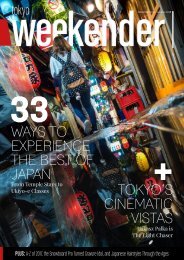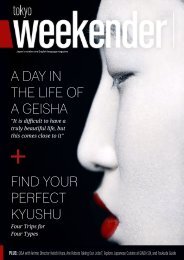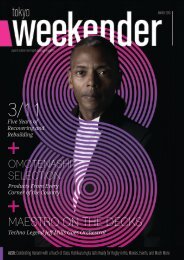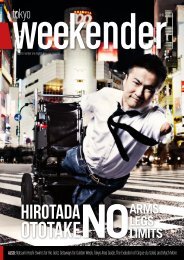Tokyo Weekender July 2016
Breaking the rules of kimono – a new book shatters antiquated views of this traditional garment. Plus: The boys for sale in Shinjuku Ni-chome, best sake of 2017, Japan's new emperor, and what really goes on inside "Terrace House."
Breaking the rules of kimono – a new book shatters antiquated views of this traditional garment. Plus: The boys for sale in Shinjuku Ni-chome, best sake of 2017, Japan's new emperor, and what really goes on inside "Terrace House."
You also want an ePaper? Increase the reach of your titles
YUMPU automatically turns print PDFs into web optimized ePapers that Google loves.
When his parents were away Naruhito<br />
would be left with nannies who were<br />
given written instructions by Michiko on<br />
how to take care of him. He was allowed<br />
no more than one toy at a time and had to<br />
be hugged at least once a day. This list of<br />
rules was turned into a best-selling book<br />
titled Naru-chan Kenpo (The Naruhito<br />
Constitution) that’s still popular today.<br />
From all accounts, Naruhito was<br />
said to have had a happy and relatively<br />
normal upbringing, especially when<br />
compared to his ancestors. His father<br />
allegedly gave him a hand-me-down uniform<br />
to wear to school and told teachers<br />
not to give him any special treatment.<br />
The young prince enjoyed watching<br />
baseball, hiking and skiing.<br />
CLUBBING, PUB CRAWLS AND<br />
TEA WITH THE QUEEN<br />
In 1983, a year after graduating from Gakushuin<br />
University, Naruhito decided to<br />
move to the UK where he did a master’s<br />
degree on the history of transportation<br />
on the River Thames at Oxford University’s<br />
Merton College. More important<br />
than his classroom studies, however,<br />
were the life lessons he learnt during his<br />
two years in Britain.<br />
For the first time, the prince had to<br />
fend for himself and seemed to revel<br />
in it. In his book, The Thames and I: A<br />
Memoir of Two Years at Oxford, he wrote,<br />
“This had been a happy time for me –<br />
perhaps I should say the happiest time of<br />
my life.” The autobiographical account,<br />
whilst not exactly hard-hitting, gives<br />
a fascinating insight into the personal<br />
escapades of a man whose privacy is<br />
usually closely guarded.<br />
Much of his first week in England<br />
was spent in the company of the royal<br />
family, including the Queen, who impressed<br />
him with her laid-back manner<br />
and the fact that she poured him a cup of<br />
tea herself. Shortly after, he moved into<br />
a shared dormitory in Oxford where he<br />
learnt how to iron and use the coin laundry<br />
machine, though his first attempt at<br />
the latter ended with him almost flooding<br />
the room.<br />
One of his favorite pastimes was discussing<br />
music over a few pints. He even<br />
went on a few pub crawls. The prince<br />
apologizes to the British public for not<br />
getting to grips with the rules of cricket,<br />
but did participate in many British<br />
sports such as tennis and rowing. It was<br />
an exciting time for a man who, under<br />
normal circumstances, can barely move<br />
without asking for permission.<br />
“I met the crown prince twice,” says<br />
social anthropologist Joy Hendry. “On<br />
the second occasion, I sat opposite his<br />
personal body guard who told me how<br />
much the prince loved being in Oxford<br />
because he could walk about in the<br />
streets and the local market where nobody<br />
recognized him, which made him<br />
feel free like any other student.”<br />
Around the city Naruhito would<br />
usually wear jeans, much to the surprise<br />
of Japanese tourists. His casual attire got<br />
him turned away from a nightclub, yet that<br />
didn't put him off. He went to a different<br />
club at a later date, dancing with girls until<br />
2am. “Perhaps this was the first and last<br />
disco I would go to in my life,” he remarked.<br />
In October 1985 Naruhito departed<br />
from the UK. “As the London scene gradually<br />
disappeared from view I realized that<br />
an important chapter in my life was over.<br />
A new page was opening, but I felt a large<br />
void in my heart, and as I stared out of the<br />
window of the plane I had a lump in my<br />
throat.”<br />
IN PURSUIT OF A PRINCESS<br />
Back in Japan, Naruhito’s activities were<br />
far more constricted, and being in his<br />
mid-twenties he was under pressure to find<br />
a bride. He could reportedly choose one<br />
himself, but she had to meet the approval<br />
of a committee of palace officials. The plan<br />
was to have him married off before reaching<br />
30, yet despite numerous candidates<br />
being put forward the prince remained<br />
single at 32.<br />
I FELT A LARGE VOID<br />
IN MY HEART, AND AS<br />
I STARED OUT OF THE<br />
WINDOW OF THE PLANE<br />
I HAD A LUMP IN MY<br />
THROAT<br />
His first choice was Harvard graduate<br />
Masako Owada, whom he pursued for six<br />
years after they met at a banquet for the<br />
Duchess of Lugo in 1986. Coming from<br />
a wealthy family, she ticked most of the<br />
committee’s boxes: highly educated, multilingual<br />
and, crucially, slightly shorter than<br />
the prince.<br />
One problem was the controversy surrounding<br />
her maternal grandfather, Yutaka<br />
Egashira. He was the former chairman<br />
of Chisso Corporation, a chemical company<br />
that dumped mercury-laden<br />
industrial waste into<br />
the bay off Minamata<br />
in Kyushu, leading to<br />
the onset of Minamata<br />
Disease. Thousands<br />
were affected by the<br />
neurological syndrome,<br />
which in extreme cases,<br />
led to insanity, paralysis<br />
and death. Though not<br />
directly involved in the<br />
scandal, Egashira’s association<br />
with Chisso was seen<br />
as potentially damaging<br />
for the imperial family.<br />
Despite this, Naruhito was still determined<br />
to wed Masako. Unfortunately, she<br />
wasn’t so keen. Twice she turned down<br />
his proposals as it would mean giving up a<br />
budding career as a diplomat for the constrained<br />
life of a princess. Not one to give<br />
in, Naruhito tried a third time and finally<br />
got his wish.<br />
Speaking at a press conference after<br />
their wedding in 1993, Crown Princess<br />
Masako said, “His Highness told me that<br />
‘you may have many worries and anxieties<br />
about entering the imperial house, but I<br />
will do everything in my power to protect<br />
you as long as I live.’”<br />
Despite the support of her husband,<br />
Masako has struggled with life as a royal.<br />
Under pressure to produce a male heir,<br />
she miscarried in 1999. Two years later<br />
Princess Aiko was born; however, as Japan<br />
operates under a system of agnatic<br />
primogeniture, this did little to solve the<br />
succession problem. It was all getting too<br />
much for the future empress.<br />
Speaking to journalists in 2004, Naruhito<br />
said, “Princess Masako still faces ups and<br />
downs in terms of her health. She’s worked<br />
hard to adapt to the environment of the<br />
Imperial Household for the past decade,<br />
but from what I can see, she's completely<br />
exhausted herself in trying to do so.”<br />
It was announced that Masako was suffering<br />
from adjustment disorder, a mental<br />
condition brought on by stress, making it<br />
difficult for her to carry out official duties.<br />
The birth of Prince Hisahito – son of the<br />
crown prince’s brother and third in line for<br />
the throne – reduced some of the pressure.<br />
Her condition is said to have improved<br />
slightly in recent years, but public appearances<br />
remain sporadic. Whether that<br />
will change when she becomes empress<br />
remains to be seen.<br />
As for Naruhito, this is a role he has<br />
been preparing for since childhood. His<br />
amiable father, ably supported by wife<br />
Michiko, is held in high regard for prioritizing<br />
disaster victims, championing the<br />
cause of marginalized people and attempting<br />
to reconcile with countries affected by<br />
Japan’s colonialism and wartime aggression.<br />
The hope is that his son will devote<br />
himself to the role of emperor in a similar<br />
fashion.
















